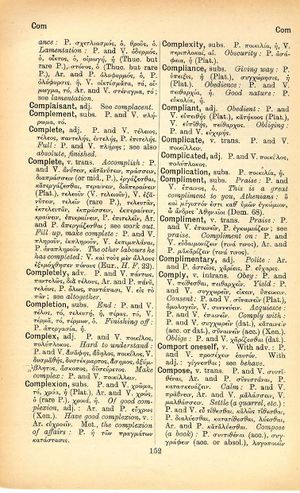compose
αἰτήσεις ἀκοὐεις σῶν ἱκετῶν· ταχἐως συνδραμεῖς ἀναπαὐων εὐεργετῶν· ἰάματα παρἐχεις, Ἱερἀρχα, τῇ πρὀς Θεὀν παρρησἰᾳ κοσμοὐμενος → You hear the prayers of your suppliants; quickly you come to their assistance, bringing relief and benefits; you provide the remedies, Archbishop, since you are endowed with free access to God.
English > Greek (Woodhouse)
v. trans.
P. and V. συντιθέναι, Ar. and P. συνιστάναι, P. κατασκευάζειν.
Calm: P. and V. πραΰνειν, Ar. and V. μαλάσσειν, V. μαλθάσσειν.
Settle (a quarrel, etc.): P. and V. εὖ τίθεσθαι, καλῶς τίθεσθαι, P. διαλύεσθαι, κατατίθεσθαι, λύεσθαι, Ar. and P. καταλύεσθαι.
Compose (a book): P. συντιθέναι (acc.), συγγράφειν (acc. or absol.), λογοποιεῖν (absol.).
Compose poetry: Ar. and P. ποιεῖν (acc. or absol.).
Compose songs: Ar. μελοποιεῖν (absol.).
Compose (for burial): P. and V. περιστέλλειν, προτίθεσθαι V. συγκαθαρμόζειν.
Be composed (for burial): P. and V. προκεῖσθαι.
Compose oneself: P. and V. ἡσυχάζειν, Ar. and V. μαλάσσεσθαι, V. μαλθάσσεσθαι, ἡσύχως ἔχειν.
Be composed of: P. συνίστασθαι ἐκ (gen.), συγκεῖσθαι ἐκ (gen.).
Words specially composed to meet the occasion: P. λόγοι πρὸς τὸ παρὸν μεμηχανημένοι (Dem. 847).
Men with composed features: P. οἱ πεπλασμένοι (Dem. 1122).
Composing his features to hide his knowledge of the calamity: P. ἀδήλως τῇ ὄψει πλασάμενος πρὸς τὴν συμφοράν (Thuc. 6, 58).

